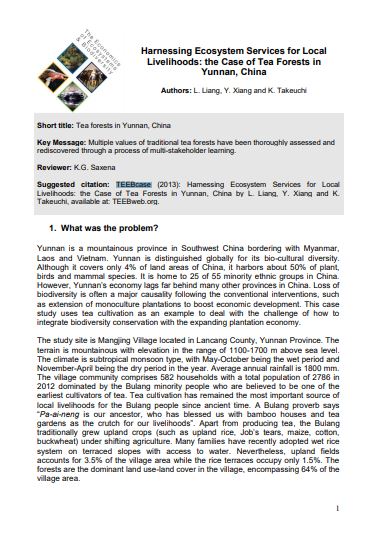Case Study
Co-designing climate services to integrate traditional ecological knowledge: a case study from Bali, Indonesia
2020
Author(s): Biskupska N, Salamanca A
This case study suggests that helping vulnerable indigenous populations adapt to climate change will require a reassessment of prevailing perceptions of their traditional ecological knowledge.
Fostering gender-transformative change in sustainable forest management: a case study of DGM Indonesia
2022
Author(s): Canpolat E, et.al
This case study informs the wider line of inquiry of the World Bank DGM & REDD+ Gender Study, which follows a conceptual framework of gender transformative change to analyze the contribution the DGM-I project is making to women's economic achievement, access to and control over productive assets, voice, and agency that support positive changes in women’s leadership and meaningful participation.
Safeguarding Lepcha and Limbu cultural values and worldviews for conservation and sustainable development in the Eastern Himalayas, India
2021
Author(s): Lepcha ET, Gurung N, Rastogi A, Swiderska K
This case study in India focused on the Lingsey and Lingseykha communities in Kalimpong District, northern West Bengal, to build on previous action research conducted through the Smallholder Innovation for Resilience project. It recommends ensuring local biodiversity management committees include Indigenous representatives to allow them to establish rules for collective resource management, building on their customary laws and values.

Harnessing Ecosystem Services for Local Livelihoods: the Case of Tea Forests in Yunnan, China
2013
Author(s): Liang L, Xiang Y, Takeuchi K
This case study shows multiple values of traditional tea forests have been thoroughly assessed and rediscovered through a process of multi-stakeholder learning.
Towards a Biocultural Heritage Territory in Rabai Cultural Landscape: Exploring Mijikenda Cultural Values and Practices for Sustainable Development
2021
Author(s): Wekesa C, Ndalilo L, Swiderska K
This case study in Kenya was conducted with the Rabai sub-tribe of the Mijikenda Indigenous community in Kilifi County, coastal Kenya. It was coordinated by the Kenya Forestry Research Institute (KEFRI), working closely with the Rabai community.
Displaced and Marginalized: Protecting the Traditional Knowledge, Customary Laws and Forest Rights of the Yanadi tribals of Andhra Pradesh
2010
Author(s): Vedavathy S
This study sought to protect community rights over TK and customary practices related to it. It was undertaken with the Yanadi community of Chittoor and Nellore districts of Andhra Pradesh and entailed an extensive survey and research to find ways to protect their rich TK, bio-resources and customary laws and practices that are intricately woven together.
Good practices in water security: ideas for praxis
2010
Author(s): Jal Bhagirathi Foundation
A repository on good practices that address the challenge of water scarcity, the publication outlines how a joint project in Rajasthan has resulted in a 140 percent decline in expenditure costs per household.
Indigenous knowledge for disaster risk reduction: good practices and lessons learned from experiences in the Asia-Pacific Region
2008
Author(s): Shaw R, Uy N, Baumwoll J., (eds.)
This publication presents a collection of 18 indigenous practices which were developed over time in the communities in the Asia-Pacific region. The cases were chosen based on the following criteria: origin of the knowledge, its relative level of adaptation over time, its relationship to local skills and materials, its success in surviving or coping with disasters over time, and its applicability to other societies facing similar situations.

Ensuring Alternative Livelihoods to Traditional Hunting Communities by Supporting Conservation of Small Forest Patches Through Ecotourism
2021
Author(s): Sharma A
Pardhis are a community of traditional hunters, who live a nomadic life, and hunt predominantly for meat. They also help farmers against crop raid by wild herbivores, cull man-eaters on behalf of communities and governments, and in the past helped royalty on hunting expeditions.
Guyana: Empowering Indigenous Forest-Dependent Communities to Manage and Monitor Forest Resources
2021
Author(s): Food and Agriculture Organization
The case study saw the successful piloting of the protocols in the village of Bethany, where community members were equipped with the skills and knowledge to negotiate with extractive resource companies and monitor their activity on customary land.



